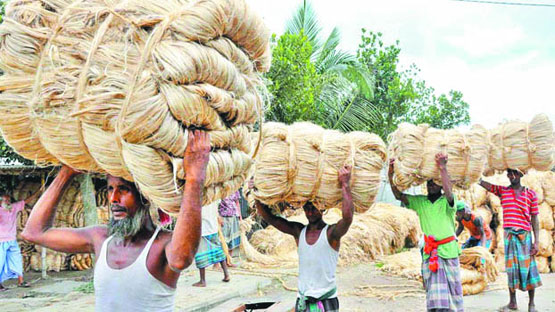Country’s jute sector in dire straits
70 mills shut down due to lack of jute
Golam Mostafa Jibon : Country’s jute sector has become chaotic due to various alleged crises.
Though, the export of raw jute is increasing every month, about 70 mills have shut down due to lack of jute. Even the existing jute mills are producing much less than the capacity. Even if raw jute is matched, the price is abnormal. So the price of the product is falling more. This is making it difficult for entrepreneurs to survive in international competition. Due to which both production and export of jute products are declining. Foreign brands and buyers are looking for alternatives. As a result, new export orders are almost closed. The jute mill owners have alleged that such situation has been created due to smuggling and illegal stockpiling of raw jute. Recently, three organizations in the jute sector, Bangladesh Jute Mills Association (BJMA), Jute Spinners Association (BJSA) and Jute Association (BJA) expressed their displeasure over this. The entrepreneurs of the jute sector complained that some traders have created an artificial crisis in the market for the purpose of making more profit. Due to their illegal stockpiling, jute is not available in the market as per the demand. The price is also unusually high. Meanwhile, the entrepreneurs have already written to the Minister of Textiles and Jute demanding a campaign in the market to curb stockpiling. They are also contacting other departments of the government including the Prime Minister’s Office.
Entrepreneurs said that, usually production at jute mills run in three shifts. The production of most of the jute mills, which was in crisis during the raw jute crisis, has now come down in one shift. It will be possible to continue production till next month with the jute in hand. No one knows what will happen next. They said that. The average price of raw jute was Tk 2,000 per mound in the last jute season. Now it is being sold at an average price of Tk 3,600 per mound. The price has gone up after the jute was released from the hands of the farmers. Farmers usually sell jute in Bangla month Ashar-Shravan.
BJMA chairman Abul Hossain said that, there are many reasons for the anarchy in raw jute market. First, some unscrupulous traders are holding jute in illegal stocks. Jute is also leaving the country through smuggling. Raw jute exports have not been stopped. The crisis has also increased due to a section of entrepreneurs in the jute sector. Despite the unanimous decision not to buy raw jute above Tk 3,000 per mound, some entrepreneurs are buying jute at higher prices.
He said there was no campaign by the government to curb illegal stockpiling. They have no choice but to stop production in March after the jute is finished. The situation started getting worse after the closure of government jute mills. The government was trying to control the jute market in the interest of supplying government jute mills.
According to BJMA and BJSA, the use of raw jute has declined by 8 percent in the first four months of the current financial year compared to the same period of the previous financial year. About 4. 61 lakh bales of jute have been used in four months of the current financial year. This amount was about 5 lakh bales in the same period of last financial year. Besides, production of jute products has decreased by 13 percent due to lack of raw jute. It has come down from 92,689 tons to 81,997 tons. Earlier, the average annual production was 10 lakh to 11 lakh tons.
Exports of jute products have also declined due to declining production. In the first four months of the fiscal year, exports fell by more than 23 percent. Compared to the same period of the previous year, the export of jute products has decreased by about 15,000 tons. Generally, 7 lakh to 8 lakh tons of jute goods are exported annually. Entrepreneurs fear that the export figures could be even more worrying in the coming months.
BJMA secretary general Abdul Barek Khan said, the problem is getting more and more obvious. There was such a crisis once in 2020. Some have continued production at a loss in the hope that the situation will change. Many have closed jute mills. Last year the situation became much more normal. However, the closed jute mill could not return to production. Since then, 70 jute mills have been closed.
BJMA has a total of 202 factories. Now there are 132 in production. Two-thirds of the jute mills have closed looms. According to the Export Promotion Bureau (EPB), exports of jute bags in the first seven months of the current fiscal year fell 24 percent from July to January. Jute yarn exports have declined by 17 percent. At the same time, more than 39 percent of the raw jute was exported.
Rare Israeli airstrike in Beirut kills Hezbollah commander and more than a dozen others
International Desk: Israel launched a rare airstrike that killed a senior Hezbollah milita…








